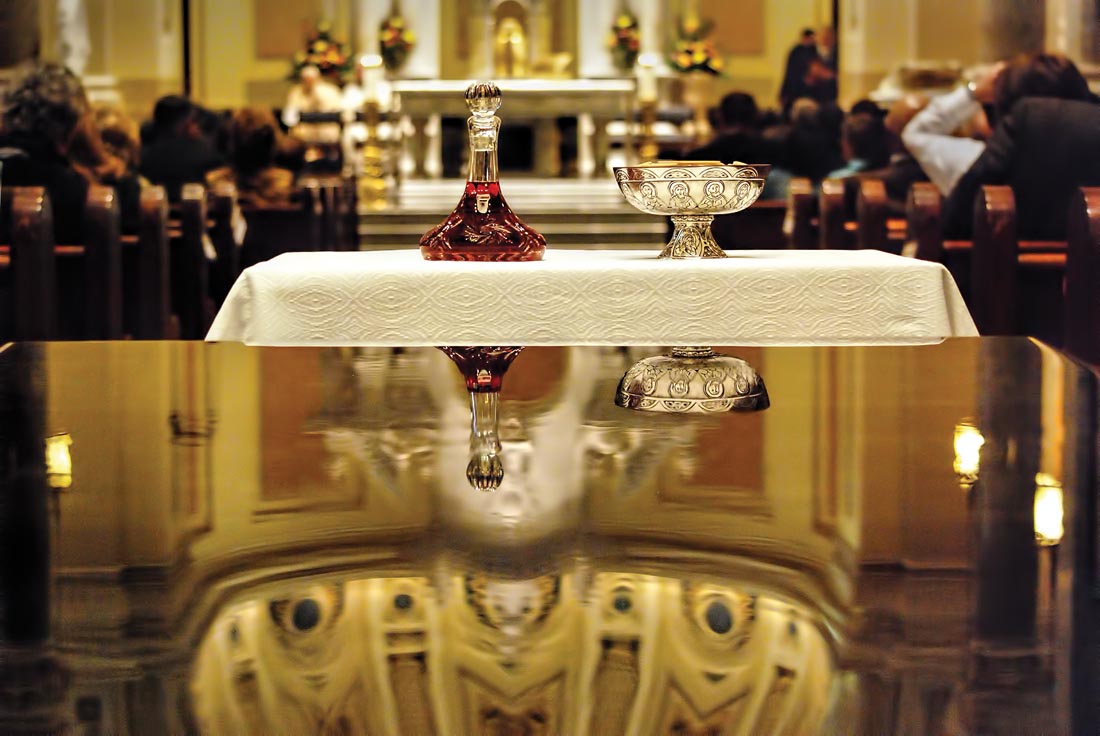
Extraordinary ministers of Holy Communion are ‘formed’
Extraordinary ministers of Holy Communion are ‘formed’
The celebration of the Mass is the primary act of worship in a Catholic’s life. It is the center of family and parish life and the focal point of Sunday, the Lord’s Day, a day of rest.
At the Last Supper Jesus instituted the Eucharistic sacrifice of his Body and Blood, according to the Catechism of the Catholic Church, “to perpetuate the sacrifice of the cross throughout the ages until he should come again.”
Altar servers, lectors, musicians and singers, and others contribute time and talent and join those in the pews for the celebration of the Mass. But there are men and women who are especially commissioned for their role of service in the Mass: the extraordinary ministers of Holy Communion.
Parishes have extraordinary ministers of Holy Communion to assist the ordinary ministers – the bishop, priests, and deacons – in distributing Communion to the faithful, usually as part of the celebration of Mass, but also for the sick and homebound.
Sister John Patrick Beckius and several priests of the Diocese of Wichita help form extraordinary ministers to assist their parish priests.
Sister John Patrick, the director of the diocesan Office of Worship, pointed out that St. John Paul II gave a wonderful explanation about the difference between ordinary Eucharistic ministers and extraordinary ministers of Holy Communion. The ministerial priest is the Eucharistic minister, the pope said, because he has the responsibility for the entire life of the Eucharist: offering the gifts, confecting the Eucharist, and distributing Communion; but also the secure custody of the Eucharist in the tabernacles, and the final disposition, for example, a host in a monstrance is destined for Communion at some point.
“So, extraordinary ministers are of only Holy Communion, and so not Eucharistic ministers,” she said.
The laity who assist the priest are “extra ordinary,” Sr. John Patrick said, so an extraordinary minister of Holy Communion is “in addition to” or “beyond” the ordinary minister.
The extraordinary ministers assist the priest, the ordinary minister, when needed: when there’s a large assembly at Mass and not enough ordinary ministers, when the priest is infirm or incapacitated in some way, or to take the Eucharist to the sick or homebound, or when Communion is offered under both forms.
Because of their special role in the Catholic liturgy, extraordinary ministers of Holy Communion are trained and participate in formation sessions.
“They’re appointed, they’re authorized to exercise the ministry, which makes it a little bit different. This ministry, out of all the others, like lectors and sacristans, is unique in that it’s dependent upon appointment by the bishop,” Sr. John Patrick said. “You can volunteer to be a lector or a sacristan or an usher, you can volunteer for the ministry and receive training at the parish and that’s sufficient. But an extraordinary minister is actually dependent upon appointment by the bishop – he’s responsible for overseeing the ministry.”
The Office of Worship assists the bishop in overseeing the ministry.
“It’s not just about knowing how to do what you need to do,” she said. “It’s so people develop the necessary knowledge and reverence for the ministry.”
Formation sessions are regularly held throughout the diocese to help the extraordinary ministers develop deeper and richer spiritual lives. The Office of Worship has developed two tracks for formation: one for initial formation, and a second for those who are renewing their mandate, those who were asked or wish to continue in their ministry.
In the Diocese of Wichita, an extraordinary minister of Holy Communion must have a mandate from the bishop to exercise the ministry on a regular basis at a specific venue, a parish, a school, or a hospital, for example. The mandate can be for a period of up to five years.
“It’s really the responsibility of the pastor to nominate you by submitting your name for this ministry to the bishop through the Office of Worship,” Sr. John Patrick said. “An individual might feel called to this and really want to be an extraordinary minister, but there should be, at some point, somehow, some conversation between the individual and the pastor.”
Those who are nominated by their pastor would attend a formation session. The nominee’s name is then placed on a certificate, receives the bishop’s signature, and is then mailed to the pastor.
“The pastor commissions, or if they’re renewing, recommissions them for that ministry. It’s always good to bless your sacristans and your lectors, but commissioning extraordinary ministers is part and parcel of the role,” Sister said.
Feel called to be an extraordinary minister of Holy Communion?
Those interested in the ministry should contact their pastor.
The Office of Worship offers up to 30 formation sessions throughout the year across the Diocese of Wichita in English and in Spanish.
